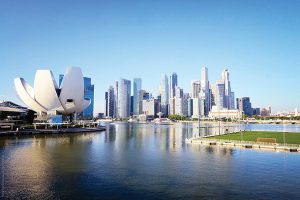To listen to Singapore’s leader, the Bank of England nailed it. The UK central bank’s warning of a tough new era that sent shockwaves through the world of monetary economics resonated in the city-state. The tiny republic that’s staked its survival on the ebbs and flows of global capitalism is girding for a protracted period of slacker growth and a drawn-out fight against inflation.
Singaporeans initially enjoyed robust growth coming out of Covid, but need to adjust to a less-favourable financial and strategic environment. That was the dour message from Prime Minister Lee Hsien Loong on the eve of celebrations marking the nation’s 57th birthday. “The world is not likely to return anytime soon to the low inflation levels and interest rates that we have enjoyed in recent decades,†Lee said.
Singapore had its share of fumbles, but it looks good now, especially when compared to the debacle of Hong Kong’s pandemic response. Even so, its next challenge is here.
Borrowing costs are climbing in almost every economy and global growth is losing altitude. That’s a familiar message to central bank watchers, though few heads of government have laid the shift out as starkly to the citizenry. Even in the annals of monetary policy, the BOE’s pronouncement days before Lee’s remarks was startling: A long recession will begin soon, unemployment will go up and inflation will remain elevated. Don’t look for rate cuts to alleviate the downturn. “To our knowledge, no central bank has ever published as negative an economic forecast as the Bank of England’s latest,†Jan Hatzius, chief economist at Goldman Sachs Group Inc, wrote in a report.
Inflation in Singapore is low relative to many advanced economies at 4.4%, excluding private transport and accommodation. It’s nevertheless accelerating; June’s reading was the highest in almost 14 years. The Monetary Authority of Singapore reckons inflation will peak next quarter, before easing towards the end of the year. Given the experience of most central banks who were surprised by the force of price increases, it would be unwise to bet the house on that. Policy has been tightened four times, beginning last year, and economists foresee the MAS tapping the brakes at least once more.
The core level inflation obscures some of the pain most households feel. The all-items consumer price index climbed 6.7%, quicker than most economists had forecast. “I know the cost of living is at the top of everyone’s minds,†Lee said. Residents are wrestling with spikes in electricity charges, contending with big jumps in rent, moaning about the cost of taxis and ride-hailing services and spiraling costs of home renovations. Singapore, which is about half the size of Maui, imports much of what is consumed on the island.
The march of inflation has been accompanied by eroding growth. Gross domestic product shrank last quarter from the prior three months, the government reported; economists had forecast a small increase.
—Bloomberg
 The Gulf Time Newspaper One of the finest business newspapers in the UAE brought to you by our professional writers and editors.
The Gulf Time Newspaper One of the finest business newspapers in the UAE brought to you by our professional writers and editors.
